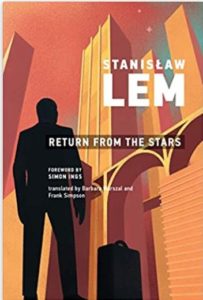 Lem is an author who reliably challenges the reader’s assumptions. He did that very well in “Solaris” and especially in “His Master’s Voice.” “Return from the Stars” is less challenging but entertaining and well-written. Astronaut Hal Bregg returns to Earth after a ten-year mission in space but because of relativistic time-dilation, the Earth has aged 127 years. He is only forty but everyone and everything he once knew is long gone. The culture has changed so much that he hardly knows what is food, what is real and what is holographic. The language has become barely understandable.
Lem is an author who reliably challenges the reader’s assumptions. He did that very well in “Solaris” and especially in “His Master’s Voice.” “Return from the Stars” is less challenging but entertaining and well-written. Astronaut Hal Bregg returns to Earth after a ten-year mission in space but because of relativistic time-dilation, the Earth has aged 127 years. He is only forty but everyone and everything he once knew is long gone. The culture has changed so much that he hardly knows what is food, what is real and what is holographic. The language has become barely understandable.
The most prominent change in society is that all newborns undergo a procedure that exorcises two human faculties: aggression and risk-taking. The reason for the first is easy to imagine, and people now live without fear of each other. It’s an intriguing concept but Lem does not play it out. All we know is that everyone is temperamentally bland. We don’t get a good vision of a world without aggression. That’s a “psi-fi” opportunity missed.
The second change, absence of risk-taking, is even less-well described. Somehow risk-taking is supposed to be related to aggression, but the relationship is unclear. Bradbury’s Fahrenheit 451 had come out ten years earlier and perhaps that provoked Lem to describe a lobotomized society, but he didn’t dig into the psychology of it. A missed three-point shot.
Later in the story, with flashbacks and reminiscences of Bregg’s adventures on alien worlds (dead worlds – no aliens), the mood is swashbuckling and the adventure is fun. Characters have serious interactions and conflicts that give the story depth and provide drama missing from the Earth society. But still no interesting insights are offered into how anybody’s mind works. A foul ball.
I also liked the description of how estranged Bregg felt upon learning in the new Earth society that all his experience held zero interest for anyone. Nobody could even remember the reason his mission was launched. It meant nothing anymore. That raised the interesting question of the purpose of any exploration. Why did Hillary climb Mount Everest? Why did Amundsen go to the South Pole? Is it mindless risk-taking? But—you guessed it—a double-fault serve.
Overall, the book is better than a lot of sci-fi, and comes tantalizingly close to being psi-fi.
Lem, Stanislaw (1966/2020). Return From the Stars. Cambridge, MA: The MIT Press, 295 pp.